Unknown Men Abduct Girls In Tehran Cutting, Stealing Hair

Local media in Iran say young girls on the streets of Tehran are having their long hair cut and stolen to sell to the beauty industry.

Local media in Iran say young girls on the streets of Tehran are having their long hair cut and stolen to sell to the beauty industry.
Sharq daily quoted an Afghan girl living in Tehran telling the story of being abducted by machete-wielding men in a car while their trunk was "full of hair bags".
She said: “I was coming home from school. Showing a knife, they took me into the car... There was a lady and a gentleman. When I got in, the two other girls were just crying…The man cut the hair of all three of us with scissors and tied it up.”
In recent years, Iranian media reported the increase in buying and selling women's hair due to financial needs, but there have been fewer reports of girls' hair being stolen.
Earlier and separate reports on the Khorasan and ISNA news websites said most of the hair reaches extension production companies in Turkey, Arab countries, China, Europe or even some countries of the Americas.
With the deepening economic crisis in Iran, in recent years, local media have repeatedly reported the "sharp increase" in the sale and purchase of body parts in Iran.
Jahan-e-Sanat daily wrote in May that some middlemen send the prospective donors to neighboring countries such as the United Arab Emirates, Turkey, and Iraq to sell their body parts for $7,000 to $15,000, the result of the country’s economic crisis, which has left many people struggling to survive.
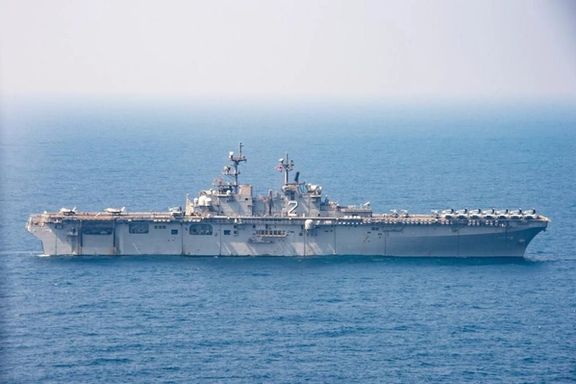
The US Navy said it prevented Iran from seizing two tankers in the Persian Gulf Wednesday in the latest in a series of seizures or attacks on ships in the area since 2019.
Chevron CVX.N said one incident involved the Richmond Voyager, a very large crude carrier managed by the US oil company, and that crew onboard were safe.
An Iranian navy vessel fired shots during the second seizure attempt, Navy Fifth Fleet spokesperson Timothy Hawkins said.
Both incidents took place in the Persian Gulf in waters between Iran and Oman.
Hawkins did not say how the US Navy prevented their seizure. Details regarding the second vessel involved in the incident were not immediately clear.
Since 2019, there have been a series of attacks on shipping in the strategic Persian Gulf waters at times of tension between the United States and Iran.
Iran seized two oil tankers in a week just over a month ago, the US Navy said.

In May, the United States announced that it was bolstering its presence in the Persian Gulf to counter destabilizing actions by Iran against commercial shipping.
“[The] United States will not allow foreign or regional powers to jeopardize freedom of navigation through the Middle East waterways, including the Strait of Hormuz,” National Security Council Coordinator for Strategic Communications John Kirby told reporters May 12. The US Navy in early June said that Iran had interfered with or attacked 15 internationally flagged merchant ships over the past two years.
Iran’s provocative actions come as attempts to restrict its uranium enrichment and reaching a nuclear agreement have remained unsuccessful since President Joe Biden assumed office in January 2021. Since then, Iran has expanded military cooperation with Russia, supplying hundreds of kamikaze drones that are being used in Ukraine against civilian and military targets.
About a fifth of the world's supply of crude oil and oil products passes through the Strait of Hormuz, a choke point between Iran and Oman, according to data from analytics firm Vortexa.
Refinitiv ship tracking data shows the Richmond Voyager previously docked in Ras Tannoura in eastern Saudi Arabia before Wednesday's incident in the Persian Gulf.
A Chevon spokesperson said "there is no loss of life, injury, or loss of containment" aboard the Richmond Voyager.
"The vessel is operating normally. The safety of our crew is our top priority," the spokesperson said in a statement.
In early June Iran claimed that it was forming an alliance with Saudi Arabia and other Persian Gulf states, as well as India and Pakistan.
"The countries of the region have today realized that only cooperation with each other brings security to the area," Iranian army's navy commander Shahram Irani was quoted as saying June 3.
The US reacted quickly saying it “defies reason” for the Islamic Republic to be part of a regional naval alliance while it is the main reason for maritime insecurity in the Persian Gulf region.
US 5th Fleet and Combined Maritime Forces spokesperson Cmdr. Tim Hawkins told Breaking Defense, a digital news outlet on global military, “It defies reason that Iran, the number one cause of regional instability, claims it wants to form a naval security alliance to protect the very waters it threatens.”
With reporting by Reuters

Iran’s IRGC Quds Force Commander claims a power shift from the West to Asia has been a result of US failings, in turn, empowering Iran.
Esmail Ghaani (Qaani) made the comments on Wednesday claiming Iran’s Islamic revolution has been the most effective factor shaping the shifting power balance.
Today, the Islamic Republic is among the most pivotal elements in the region, he claimed. Citing the example of Iraq, where Iran’s IRGC created large militia forces in the mid-2010s to fight against the Islamic State group and exert the regime's influence in Iraqi politics, he explained how Iran has increasingly wielded a hand behind the scenes - much to the chagrin of the Iraqi people.
Iran facing economic isolation from the West and a series of domestic crises, chief among them a lack of oil revenues due to US sanctions and popular opposition, resorts to highlighting the role of Russia and China and its relations with the two powers.
Ghaani also pointed out the growing influence of China, which has begun to step into roles once dominated by the US, not least, in the Middle East. “Let us find our place in this changing of power structure," he said. "Good steps have been taken, but we need to figure out when to get on the power transfer train.”
The perceived lessening of US activity in the region as the Biden administration continues to retreat from Middle Eastern affairs was hailed, Ghaani asserted the regime's resistance to a country it brands its 'enemy'.
“The problem is that we want to tread our own path, but the US wants to put us on a path that it defines itself. The art of the Islamic revolution is to recognize its own path and move in this direction,” added Ghaani.
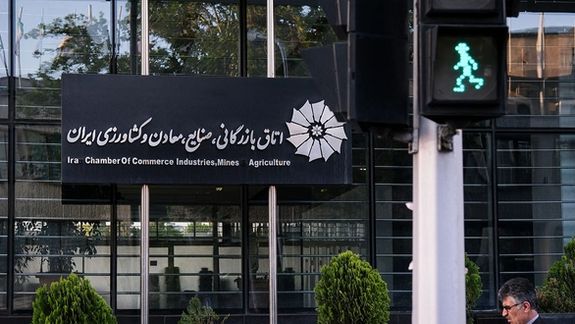
The recently elected chairman of Iran's chamber of commerce, who is being challenged by hardliners and the government, has denied reports about his resignation.
On June 26, the official news agency IRNA claimed that Hossein Selahvarzi had resigned from chairmanship of the chamber but he denied his resignation in a tweet.
“The government’s official news agency has either been hacked or become a toy in the hands of some individuals," he wrote. "They may, as they have done many times, eventually remove the news item from their feed."
Iranian journalist Saba Azarpeik reported on July 1 that Selahvarzi was barred by the ministry of industries, mines and commerce, on orders from the intelligence ministry, from participating in a conference celebrating the National Industries and Mines Day.
Azarpeik is one of Selahvarzi’s critics and has made allegations of corruption against him, claiming "Selahvarzi caused damage to the interests of 500 businessmen [who are members of the chamber]” .

"The government’s stance regarding the elections of the chamber of commerce is the same as the stance of supervisory [security] bodies,” said Ehsan Khandouzi, Minister of Economic Affairs and Finance and the government’s economic spokesman.
On July 4, the semi-official Iranian Students News Agency (ISNA) published an image of a handwritten letter which appeared to have been written by Selahvarzai to the chamber’s board to resign.
Selahvarzi on Tuesday again denied his resignation in a tweet and said he is carrying out his duties as chairman. He added that the letter lacked “legal status” and promised to make “detailed revelations” about the matter on July 9.
In elections held on June 18, Salahvarzi, a businessman who has been an outspoken critic of the government, was elected as chairman. One of the two candidates who ran against Salahvarzi, Younes Zhaeleh, is known to have close ties with the government.
Salahvarzi obtained 265 votes against 95 votes for Zhaeleh and 62 votes for Hossein Pir-Moazzen.
The chairman of the chamber, often referred to as the “private sector’s parliament” with over 400 members, has the role of coordinating between the private sector and government and is sometimes required to participate in meetings with government officials.
Members of the chamber have often criticized regime policies that have led to an economic crisis, including a confrontational foreign policy. The chambers often produce economic reports that the government finds embarrassing, or they criticize proposed budget bills and other plans.
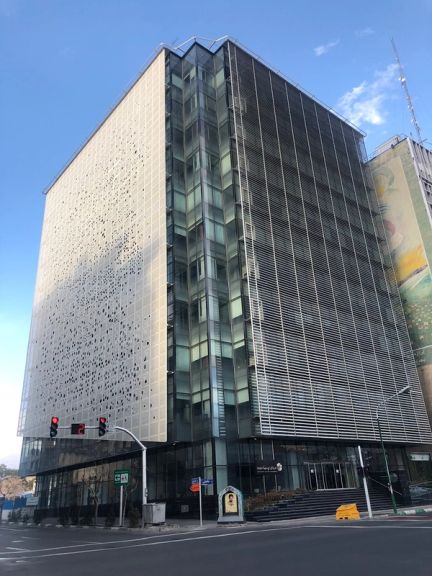
“Chairmanship of the chamber of commerce is not an official position in the Islamic Republic. The chamber is a non-governmental and non-state body and represents the private sector,” Abdolreza Davari, one of former President Mahmoud Ahmadinejad's advisors and confidants, said in a tweet Tuesday, calling “politically-motivated interference” in chamber of commerce elections by the state “a dangerous phenomenon”. “The affairs of the chamber of commerce should be decided and regulated by the members of the chamber itself,” he added.
A few days after Selahvarzi’s election, around 30 hardliner lawmakers had urged the government to annul the elections.
According to the reformist Iranian Labour News Agency (ILNA), 70 lawmakers have written a letter to Abbas Aliabadi, minister of industries, mines and commerce asking him to endorse the elections and prevent “illegal interferences that will have no outcome other than harming production and employment”.
Rouhollah Izadkhah, a hardliner lawmaker, has claimed that the letter of support has been forged because the parliament has been in summer recess in the past week.
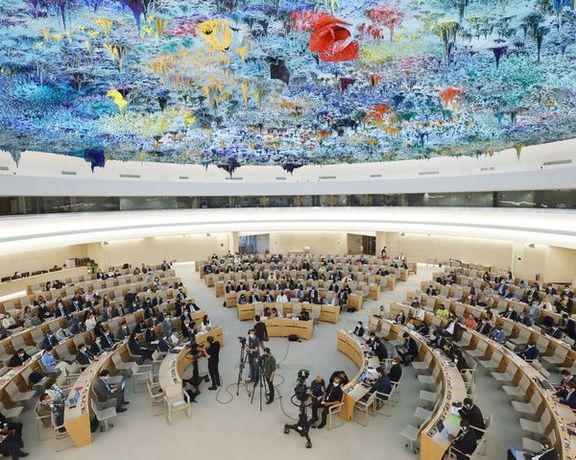
A fact-finding mission mandated by the UN urged Iran on Wednesday to stop executing people sentenced to death for anti-government protests that rocked the country last year.
The death of 22-year-old Mahsa Amini in September 2022 while in the custody of the country's morality police unleashed a wave of mass protests across Iran, marking the biggest challenge to the Islamic regime in decades.
Since then, several people have been hanged for participating in the unrest, and other detainees still face the danger of capital punishment.
"We call on the Iranian authorities to stop the executions of individuals convicted and sentenced to death in connection with the protests and reiterate our requests to make available to us the judicial files, evidence, and judgments regarding each of these persons," Sara Hossain, chair of the Iran Fact-Finding Mission, told the Human Rights Council in Geneva.
The mission also called for the "release all those detained for exercising their legitimate right to peaceful assembly and for reporting on the protests".
Responding to the statement in comments to the Council, Kazem Gharib Abadi, secretary general of Iran's High Council for Human Rights, called the establishment of the fact-finding mission last year "an entirely politically motivated and unacceptable move". He then walked out of the session in protest.
The Iranian representative in the session complained about the use of the word "regime" for the Islamic Republic in several occasions until the chair of the session said he no longer allows such interruptions.
In May, Iran executed three men it said were implicated in the deaths of three members of its security forces during the demonstrations.
With reporting by Reuters
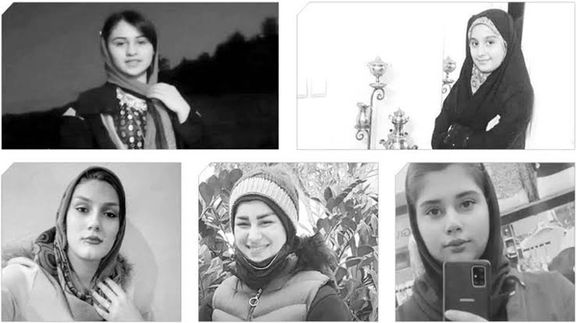
New research has revealed that at least 165 women were killed by one of her family members in Iran within the last two years.
According to an investigative report by Sharq daily citing official sources, 108 women were killed by their husbands, 17 by their brothers, nine by their sons, 13 by their fathers, and 19 by other men in the family.
The findings, which reveal how deeply domestic violence has become embedded in Iranian society, show that on average, a woman was killed by a man in her family every four days.
Out of 165 women who were murdered, 43 were shot, often with hunting rifles, pistols and even Kalashnikovs. Another 40 were stabbed to death and 35 were strangled either by hand, scarves and bedding.
Six women were set on fire, either by pouring gasoline directly on them, or setting fire to the car or the house where the victim was staying. Another 41 victims were killed in other brutal ways such as hammer blows to the head and body and mutilation. Only in 11 cases did the killer commit suicide after the crime.
Family disputes have been quoted as the cause of 87 cases out of 165 murders while 38 cases have been deemed as honor killing, 10 murdered due to financial issues and 30 others where there is no clear cause for the murder.
Perpetrators of honor killings are often not brought to justice in Iran as most families do not demand harsh punishment for them, particularly if the perpetrator is the victim’s father.